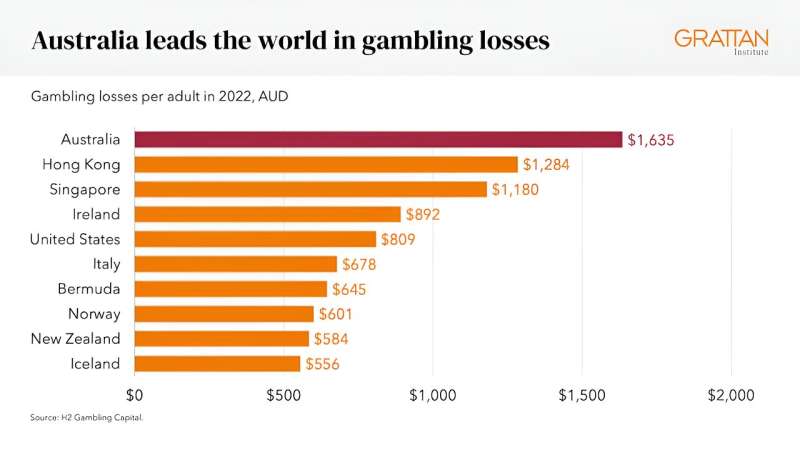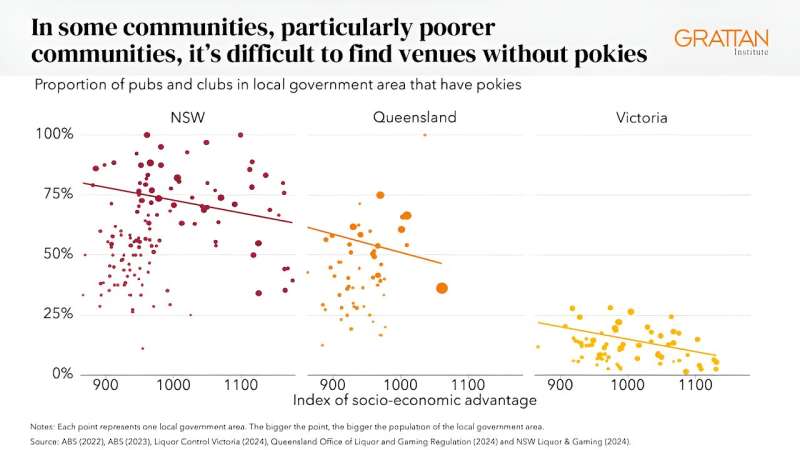This article has been reviewed according to Science X's editorial process and policies. Editors have highlighted the following attributes while ensuring the content's credibility:
fact-checked
trusted source
written by researcher(s)
proofread
Gambling is causing great harm—here's how to tip the odds back in the community's favor

Gambling harm dwells in the dark, often in the night hours, usually unspoken, yet it casts long shadows across our communities. But the spotlight is finally on gambling and the industry that pulls the strings.
A new Grattan Institute report, A better bet, shows how Australia has let the gambling industry run wild. The report lays out a roadmap for federal and state governments to prevent gambling harm.
The spotlight in recent weeks has been on a proposed ban on gambling advertising, as the federal government considers its response to the 2023 Murphy Inquiry. This federal parliamentary inquiry into online gambling harm remarkably reached multi-party consensus on all 31 recommendations.
Banning gambling ads would certainly be a good start. But we need to go further to prevent harm, particularly when it comes to pokies and betting.
Gambling is everywhere, addictive and harmful
Australians lose A$24 billion a year gambling, mostly on pokies and betting. Our losses are the highest in the world.
While many people enjoy gambling without suffering harm, it is all too easy to lose too much. Gambling products are designed to be addictive—to keep you playing well after the fun has stopped.
Gambling can harm people's financial security, health and broader well-being. And it is not "just" those who gamble who pay the price. Gambling harms families, colleagues and the broader community too.
In some cases, the consequences can be catastrophic, including job loss, bankruptcy, fraud, relationship breakdown, family violence and suicide. The effects ripple through our communities.

Gambling is hard to avoid in Australia, because it's everywhere: on our screens, in our pubs and clubs, and available any time at our fingertips. And a flood of advertising continually prompts us to gamble.
Vested interests regularly thwart reform
The pervasiveness of gambling is no accident: it's the result of decades of policy choices that have allowed the gambling industry, and its associated harm, to proliferate. While gambling is considered a heavily regulated industry, current regulations are not particularly effective at reducing harm, let alone preventing it.
Vested interests have thwarted many past attempts to strengthen consumer protections, so gambling reform is now considered very politically risky. Gambling is intertwined with our local pubs and clubs, with our major sporting codes and with Australia's major television networks.
The industry has a track record of stoking community fears about unintended consequences. Our report shows these fears don't stand up to scrutiny. We found:
- sport and free-to-air TV will survive without gambling ads
- clubs will thrive with less pokies revenue (as they do in Western Australia)
- there are actually very few jobs at risk in gambling, and those that are at risk already have a high turnover rate and the people doing them have highly transferable skills.
And the idea of a mass exodus to illegal gambling is a furphy—legal gambling is the bigger risk for most Australians.
While the politics of gambling reform is undoubtedly tricky, it ultimately does not excuse weak regulation.
Ban ads to reduce exposure to gambling

Banning gambling advertising would go a long way towards reducing Australians' excessive exposure to gambling. The "torrent of advertising" normalizes gambling for young people and makes it harder for people suffering gambling harm to break the cycle.
A full ban is important. Partial advertising bans, by definition, leave gaps, and advertisers will capitalize on these gaps. Gambling advertising on TV actually increased after gambling advertising restrictions during live sport were introduced in 2018. Similarly, in the 1970s, a ban on tobacco advertising on radio and TV just pushed advertising into print media, billboards and sponsorships instead.
The federal government should ban all gambling advertising and inducements, as the Murphy Inquiry recommended last year.
Australia needs a 'seatbelt' for gambling too
We also need a "seatbelt" on the most dangerous gambling products—pokies and online betting—to prevent people from suffering catastrophic losses.
Mandatory pre-commitment with maximum loss limits is the most effective way to make pokies and online betting safer (and ultimately more enjoyable). State governments should roll out state-wide schemes for pokies, as Tasmania is already doing. The federal government should introduce a national pre-commitment system for online gambling.
Under our proposed schemes, gamblers would choose their limits in advance—before they lose track of time, start chasing losses, or are otherwise impaired in their decision-making. The system would then enforce these limits. There should be a regulated upper limit on losses—for example, $100 a day, $500 a month and $5,000 a year.
The system needs to be mandatory to be effective, but it would have very little impact on people who gamble in moderation. It's a seatbelt for gamblers: it should hardly be felt when everything is going smoothly, but prevent serious harm when something goes wrong.
Gambling harm has lived in the shadows for too long. It is largely preventable. Federal and state governments should brave the vested interests and work together in the interests of all Australians to make gambling a safer, better bet.
Provided by The Conversation
This article is republished from The Conversation under a Creative Commons license. Read the original article.![]()





















